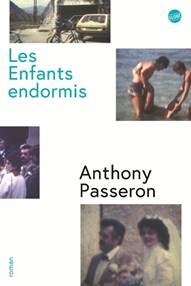Sleeping Children (Les enfants endormis)

WINNER of the Prix Première Plume
SHORTLISTED for the Prix Fnac
SHORTLISTED for the Prix Medicis Essai
LONGLISTED for the Prix Decembre, the Prix Weber & the Prix Litteraire des Inrockuptibles

Forty years after the death of his uncle Désiré, Anthony Passeron decided to investigate his family’s past. Evoking the social climbing of his grandparents who became the local butchers during the period of great economic growth in France between 1945 and 1975, and the gulf that opened between them and their children’s generation, Anthony Passeron weaves two stories: that of the appearance of Aids in the early 1980s in a family living in the countryside behind Nice, in South Eastern France and that of the fight against the illness that was undertaken in French hospital, focusing on the experts in retrovirology, Luc Montagnier, Françoise Barré-Sinoussi and their colleagues, who discovered evidence of a retrovirus that was eventually named Human Immunodeficiency Virus.
LES ENFANTS ENDORMIS exposes the widespread use of hard drugs in the South of France in the 1980s (Désiré contracted HIV by sharing needles, ‘sleeping children’ is how locals describe young people found passed out after injecting heroin). It reveals the as yet relatively unknown tension between the French team of doctors who first discovered the HIV virus and the American teams who were initially convinced that the French were mistaken, and the way they eventually allied forces. The research of the team of French scientists formed the basis for the development of HIV testing and antiretroviral therapy, they were eventually awarded the 2008 Nobel Prize in Medicine ‘for their discovery of human immunodeficiency virus’.
Reminiscent of Annie Ernaux and Didier Eribon, Anthony Passeron mixes sociological investigation and intimate, personal history. In LES ENFANTS ENDORMIS he evokes the loneliness of the families affected at a time when no one understood the nature of the virus, denial was overwhelming and patients were treated like pariahs.
"Without ever raising your voice, you have shattered the family silence that scabbed over tragedy and produced a work so powerful, so moving that it lingers long after reading. Magnificent."
- Annie Ernaux
"WE LOVE: the sober style, the sharpness of the sociological analysis, the melancholic elegance shown by the author in mixing the intimate and the collective, the family secret and the medical investigation in a story with two voices both impeccably documented and deeply moving.”
- Madame Figaro
"The author holds the emotion as one holds a note. (…) The story was born from Anthony Passeron's desire to understand the history of his family. What did people know? What were they thinking? So many questions, so few answers. The author evokes a peripheral France, a generation marked by AIDS, a social ascent killed in mid-flight."
- Journal du Dimanche
"Anthony Passeron signs a great novel on forgetting, carried by a precise and sober language. The short chapters on the trajectory of his uncle alternate with those devoted to the discovery of AIDS in France. At first, the attention of researchers and the media focused on Paris and gay circles. Forty years later, the story of these young people from Provence on the front line of drug trafficking organized by the "French Connection" is finally told."
- Magazine Lire
"The book alternates the story of Désiré's life, that of his daughter, and short chapters which describe with informative simplicity the discovery of AIDS, the role of the various protagonists and the stages of research that led to the development of AZT, from 1981 to the mid-1990s. This mirror effect amplifies Désiré's destiny."
– Liberation
“Missing words are the very substance of this first novel. The author tries to rewind the thread of a life interrupted by an illness kept hidden by the omerta of a family anxious to silence both opprobrium and grief. With great subtlety, Anthony Passeron weaves the story of a disease that is generating death and discrimination and the personal tragedy of a family inoculated by misfortune.” - Livres Hebdo
"Sensitively written yet without concessions. Anthony Passeron searches like an archaeologist the remains of his past. This is a novel that digs deep into what is most private and has a bittersweet sociological element reminiscent of Tristan Garcia and Annie Ernaux. Between fear, suffering and denial, it says everything about the distress of families confronted with this disease that no one knew anything about."
- Technikart
"Telling the story of a family from a small village in the hinterland of Nice, from the 1930s to the 1990s, in parallel with that of the AIDS virus, Anthony Passeron recounts with modesty and sobriety the story of a family tragedy hidden behind silence and shame and weaves it brilliantly with the story of the scientific struggle."
–Page des Libraires
"Anthony Passeron writes an original and profound book... Sleeping Children faces with delicacy the consequences that silence can have on children and grandchildren of those who have lived certain dramas personally."
- Robinson – La Repubblica
"Sleeping Children is a beautiful novel about the private sense of loss of a family struggling with Désiré’s drug addiction and AIDS and the collective bewilderment of a community in the early eighties."
- La Lettura – Corriere della Sera
"Meticulous and overwhelming"
- De Volkskrant
"Passeron’s family fell apart because of illness, death, grief and the inability to deal with it. With his book he breaks the silence and prevents the family history from vanishing. He brings them back to life beautifully."
– Trouw

